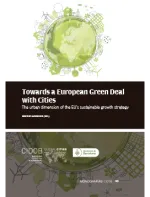After Paris: The new governance ecosystem for climate action and the role of the EU

Climate change is one of greatest challenges the world has ever faced. Its consequences, both human and environmental, are extraordinary (Houghton, 2015; Emanuel, 2018). Acting to limit its most harmful effects is at once essential and immensely difficult. States and other actors must confront a variety of tricky, overlapping cooperative and distributional issues (Bernstein and Hoffmann, 2019; Colgan et al., 2020). This can clearly be seen at the international level within the context of the United Nations (UN) negotiations, where states have sought to establish the mechanisms needed to reduce global emissions and adapt to the changes that are already imminent. For many years, these were singularly unsuccessful. The 1997 Kyoto Protocol, the first major agreement reached under the UN Framework Convention on Climate Change (UNFCCC), was harshly criticised. Its immediate successor – the Copenhagen Accord of 2009 – was even more widely lambasted. It was not until the Paris Agreement of 2015 that states agreed upon a response that is thought to hold greater promise for addressing the challenge of climate change (Held & Roger, 2018; Falkner, 2016). Yet, shortly after coming into force, its relevance was called into question by President Donald Trump, who announced that he was pulling the US out of the agreement (Macneil & Paterson, 2020).